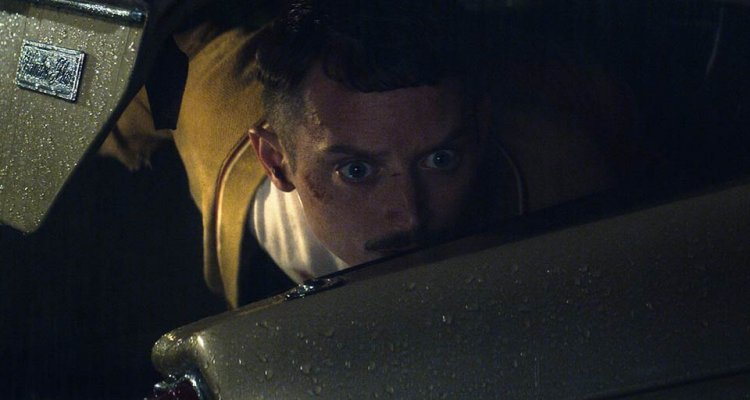Countless films about the dynamics of father and son relationships have made, but “Come To Daddy” somehow still manages to bring something entirely new to the highly-dysfunctional perspective of that genre. Director Ant Timpson’s feature debut is a f*cked-up, funny exploration of the fraught familial relationship, defying genre and expectation at every hairpin turn. Premiering in the Tribeca Film Festival‘s Midnight category “Come To Daddy” is definitely not going to be everyone’s cup of tea. If the walkouts at my screening are any indication, it will cause some people to sputter and spit it out at the acrid first taste. Meanwhile, more adventurous viewers will gulp it up, and ask for boiling heat to warm up its distinct flavor, but this is not a film that wants to be watered down.
READ MORE: Tribeca Film Festival: 15 Must-See Movies
Though Norval (Elijah Woods) is estranged from a father he hasn’t seen in 30 years, he receives a letter one fateful day asking him to visit his dad at his remote home on the Oregon coast, and surprisingly, the troubled young man, coming off issues with alcohol, agrees. Clad in a wide-brim pork pie hat and polished Doc Martens, a mustachioed Norval is better suited for a music festival featuring bands you’ve never heard of than a trip to the country. He lugs his wheeled suitcase through the woods, only to arrive and his father (Stephen McHattie) is unable to recognize him when he first answers the door. That initial awkwardness only gets worse— the pretentious hipster son desperate to impress his casually cruel dad, and a weird power game between the two commences. It only gets more bizarre as days pass at the isolated house, and, oops, Norval’s dad destroyed his son’s limited edition real gold iPhone, so they’re limited to each other’s company and a rotary dial phone to the outside world.
Written by “The Greasy Strangler” scribe Toby Harvard, a provocative, challenging movie that also causes walkouts during its Sundance premiere, “Come to Daddy” goes to many unexpected places, twisting and changing into something bizarre like a drip into toxic waste. This movie isn’t quite as off-putting as Harvard’s previous film, but it’s still going to alienate some of those who stumble upon it unwittingly. With a ‘70s exploitation vibe in its aesthetic, “Come to Daddy” melds a blackly comic streak through its grimy horror and unsettling thriller elements. “Come To Daddy” gets really gnarly at times, and its ability to simultaneously repel you and draw you back in is a credit to director Timpson who makes an assured debut here. The New Zealand native is best known as a producer of “The ABCs of Death” series, and this film has no trouble leaning into its grosser elements and some seriously messed-up (but seriously creative) violence.
READ MORE: If John Waters Made ‘Barton Fink’ The Result Would Be ‘The Greasy Strangler’ [Review]
But most impressive about “Come to Daddy” isn’t just its uneasy comedy, gross-out moments, or the way it marries the two together. It’s that this movie actually has more on its mind than making its audience alternately laugh and gasp— and sometimes in the same breath. ‘Daddy’ wisely tackles father and son estrangement and all that it involves, but it also delves into how we deal with grief, particularly when there are unresolved issues present in the relationship with the deceased. That type of sorrow is always complex, but it melds with anger, guilt, and resentment to make an especially complicated cocktail in situations like these. Timpson’s film also isn’t afraid of digging into male privilege in engaging ways, making it an excellent double feature with “Under the Silver Lake” — that is, if you can stomach four hours of two unlikable male protagonists.
Wood is well cast as the lead, who’s always watchable here even as our eyes are rolling back into our heads when he says some ridiculous stuff. It’s an interesting companion piece to his role in “I Don’t Feel at Home in This World Anymore.” These characters are vastly different, but the world they’re playing in is oddly similar, sharing a skewed view of the universe. McHattie is always compelling, and he is all too convincing as a terrible human
Harvard’s script has some gaping holes in it, particularly when the story gets truly wild in its second half, but it seems like a minor quibble in a film this bold. Provocative and ballsy, its filmmakers probably having had their share of toxic relationships, and “Come to Daddy” doesn’t give a shit if you like it and perhaps even dares some audiences to sit through it unfettered. Ultimately, it knows that those who stay are on its weirdo wavelength and are in for something insanely entertaining. [B+]
Follow along with all our coverage from the 2019 Tribeca Film Festival here.

